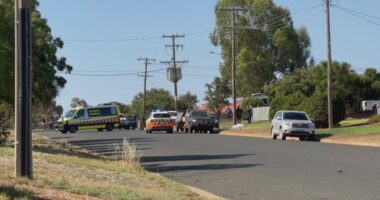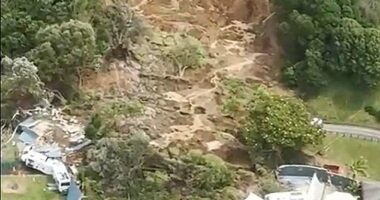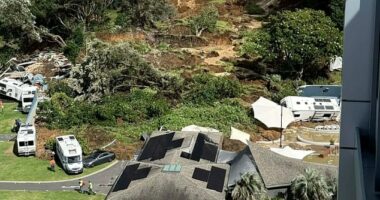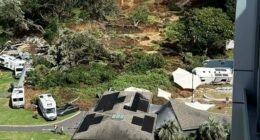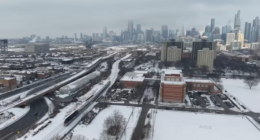Share this @internewscast.com
Karam has been in the care of the SOS staff since a rescue worker brought him there the previous year. In April, he marked his first birthday at the temporary shelters that now serve as his home. He enjoyed a haircut and wore a specially made outfit.
“For children who are alone… we strive to immediately place them in a shelter to guard against risks like abuse and exploitation to which these youngsters are particularly susceptible.”

Under Islamic law, adoption is not allowed, and children who lose their parents may encounter legal issues, such as the absence of inheritance rights, along with the psychological effects of losing loved ones and being raised in a conflict zone.
The ‘lonely refugees’
Jarada estimates that Al-Amal — which means “hope” in Arabic — is currently looking after 25 minors who are what they call ‘lonely refugees’: children who have lost all family members.
The situation is tragic. Losing parents and extended family is a trauma that no care centre can ever replace.
‘Their future is filled with uncertainty’
The children are living in a displacement camp in Khan Younis, in the south of Gaza, after being evacuated from the not-for-profit’s previous site in the southern town of Rafah, which was destroyed.

The former SOS Children’s Village buildings in Rafah, before they were destroyed, likely in 2024. Source: Supplied / BO Holmberg/SOS Children’s Villages International

The site of the former SOS Children’s Villages buildings in Rafah in Gaza’s south. Source: Supplied / SOS Children’s Villages International
SOS’s program director in Gaza, Reem Alreqeb, says: “We are living in tents and wood caravans that offer little protection from the elements.”
“The scarcity of nutritious food is alarming, especially for younger children.”

SOS Children’s Villages International is helping to take care of children without parental care in Gaza. Source: Supplied / Mohammed Abed/SOS Children’s Villages International
According to Alreqeb, many children are showing signs of distress, nightmares, withdrawal, and emotional numbness.
“Some of these children were born outside of wedlock, and others have lost all known relatives during the war.”
There are no immediate family members to turn to, and their future is filled with uncertainty.
These include 10 whose entire families were killed during the war, for whom no extended family could be found, and 12 children born out of wedlock and abandoned at birth.
Thousands of children orphaned
The agency’s Gaza spokesperson Rosalia Bollen says Palestinian authorities report that almost 2,000 children have lost both parents.
At times, Jarada says Al-Amal has had to turn away unaccompanied children because it has no room or capacity to look after them, especially during evacuations.
It’s devastating — it undermines the institution’s mission and goals. I feel powerless and defeated.
The overcrowding has disrupted services for the orphans, including their education, because classrooms are now being used as shelters. Families are surviving on one meal a day, typically consisting of rice, pasta, and lentils.

Damaged buildings at al-Amal Institute for Orphans where thousands of families are seeking shelter. Source: Supplied / Al-Amal Institute for Orphans
Mohammad Othman, a spokesperson for Olive Kids, an Australian foundation that supports Palestinian children and the work of organisations such as the Al-Amal Institute for Orphans, says the reports coming out of Gaza are heartbreaking.
“We’ve heard stories of kids that have lost their parents that basically, they’re in a shelter with a whole bunch of other people and they’re effectively adopted by the village,” he says.
The practice of ‘kafala’
UNICEF supports this arrangement by providing support to extended families who take on the care of unaccompanied or separated children.

Orphans at the al-Amal Institute for Orphans are living with thousands of other displaced families. Source: Supplied / Al-Amal Institute for Orphans
By way of example, Bollen says one couple taking care of their two nieces, who lost both their parents and some of their limbs in an airstrike, have been provided with a wheelchair and other assistance.
Parents will sometimes receive treatment at a different hospital or may be arrested and taken away.
“Even after reunification, we continue to follow up with these children to monitor their well-being and intervene when needed,” Alreqeb says.
Children left behind
“Sadly, they’re up for a really tough life,” Othman says.
There’s so many challenges for them. [Many] have seen a lot of violence, they’ve lost their parents, they’ve seen their entire world crumble around them. It’s very likely they’re going to have really serious PTSD.
“If the fostering process works well and conditions improve, there is hope that we can identify a suitable family,” Videt says.

Children who have lost their entire families during the war in Gaza face a future filled with uncertainty. Source: Supplied / SOS Children’s Villages International
But Videt notes SOS’s 2024 global report on children’s care and protection found that children without parental care often face discrimination and stigma in many parts of the world.
“This can take the form of legal disadvantages, such as lack of inheritance rights or limited access to alternative care pathways, as well as deep-rooted social stigma, particularly for children born out of wedlock or those separated by conflict,” he says.
In contexts like Gaza, where formal adoption is not permitted and family tracing is often impossible due to war, these children can face further marginalisation as they grow up.
“This stigma of deprivation is lifelong. It’s hard to describe, but it is perhaps the most painful kind of societal exclusion,” he says.
What about international adoption?
She says once there is a ceasefire, there will likely be discussions on institutionalising care for children.
“Perhaps things that didn’t happen too much before start happening because of the gravity of the situation,” he says.
Many families have lost everything
Bollen says children have been robbed of their childhoods.
I’ve seen children fighting with each other over a bag of bread. I’ve seen [older] children fighting with adults.

